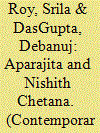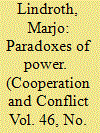| Srl | Item |
| 1 |
ID:
177936


|
|
|
|
|
| Summary/Abstract |
This article examines self-making projects and the desire for respectability within queer lives in Kolkata, across distinct class-caste affiliations. We argue the desire for queer respectability take virtual forms, sartorial fashioning, and yet remains a convoluted project mirroring Kolkata’s relationship with neoliberal capitalism. The authors engage with a young lesbian identified activist and a young male fashion designer whose sexual identity remains tacit. Their virtual and real interactions reveal how both the characters conceal their caste and class status through projects of sartorial fashion in order to be read as appropriately queer. The article argues for understanding sexual and gender identities in relation with class, and caste status, as well as ethnic and religious identities, thereby revealing how the liberatory potentials of queer activism is a form of emergent neoliberal governmentality within contemporary India.
|
|
|
|
|
|
|
|
|
|
|
|
|
|
|
|
| 2 |
ID:
110772


|
|
|
|
|
| Publication |
2011.
|
| Summary/Abstract |
In the United Nations (UN) Permanent Forum on Indigenous Issues (PF), indigenous political subjectivities take shape in the power relations that not only make indigenous peoples subjects but also subjugate them. This article discusses the process and the possibilities of resistance that open up for indigenous peoples within it. The approach taken acknowledges the limiting political environment of the UN for indigenous peoples, because it is a non-indigenous political system based on state sovereignty. Yet, it does not view the situation of those peoples in the PF as totally determined by the states and their dominant discourse. The theoretical framework of the article draws on the work of Michel Foucault and his conceptions on power, resistance, subjectification, technologies of domination and of the self. The power struggles in the PF, described through the complex of sovereignty, discipline and government, and the resistances within them engender paradoxical indigenous subjectivities: colonized/decolonized, victim/actor, traditional/modern, global/local. Indigenous peoples are able to engage both in resistance that is a reaction to states' exercise of power or the creative use of its tools and in indirect resistance that 'stretches' the UN system and constitutes action on its own terms.
|
|
|
|
|
|
|
|
|
|
|
|
|
|
|
|